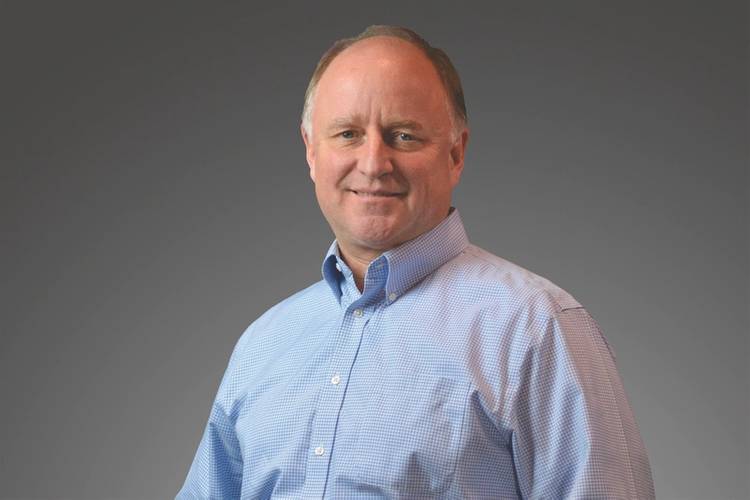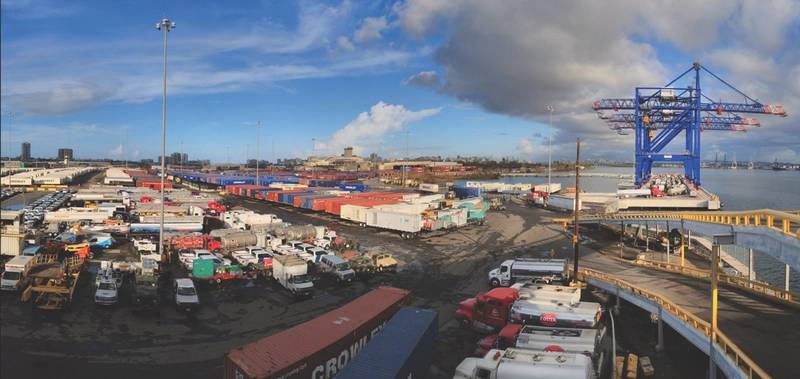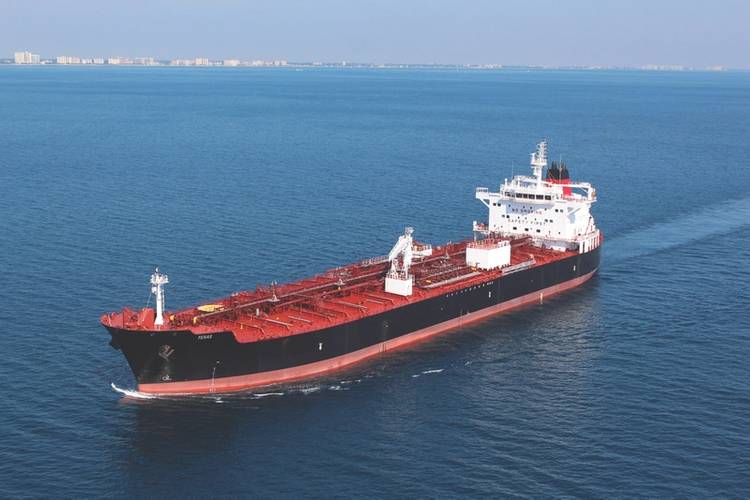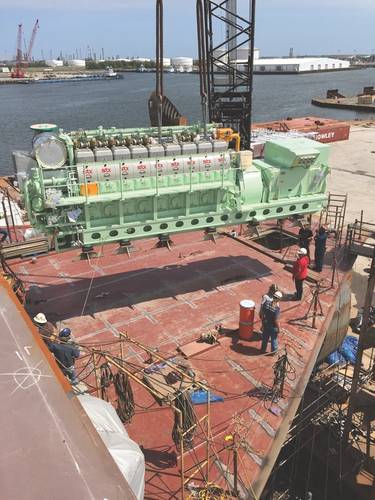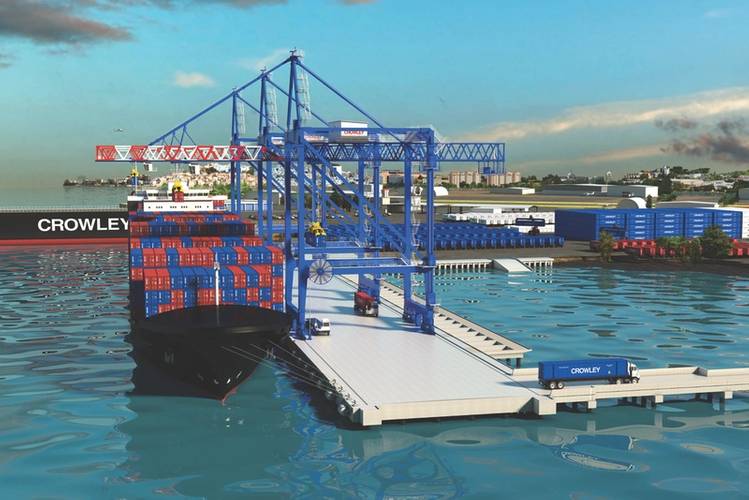Tom Crowley has become the face of the U.S. maritime industry, steadily building his transport and logistics company into a formidable goliath. From Jones Act waivers to emerging emissions technology to the devastation of Hurricane Maria on Puerto Rico, Crowley weighs in on the pressing matters of maritime with refreshing candor.
The last time we caught up with Tom Crowley two years ago at this headquarters in Jacksonville, Fla., we were handed a safety bulletin and Tom Crowley himself came down to the lobby to greet us. “Safety and People: The Crowley Way,” was the natural headline and two years later, nothing much has changed, which sets perfectly well with Tom Crowley, the ubiquitous leader of this 125-year-old maritime company.
The State of the Market
“I think from an infrastructure point of view the U.S. Maritime Industry is as strong as it has ever been, with respect to new vessels that have been built on the tanker side, the new containerships under construction, the offshore boats, the tugs and the heavy lift barges … you name it and the shipbuilding market is coming off of a boom,” said Crowley.
Then there is a pause, and the inevitable “but.”
“But clearly the shift in the energy sector has reduced the amount of product being moved by sea, and reduced the level of exploration projects,” said Crowley. “The offshore industry has a tremendous infrastructure that is built and ready to work, but the work simply is not there. This is putting a tremendous strain on labor pools, and a tremendous strain on balance sheets.”
When the oil market was booming and crude was flowing from the inland oil and gas fracking fields to refineries on the coasts, Crowley was a major player in the construction of new tanker tonnage to help carry the load. But markets and regulators simultaneously turned south, as the oil bust – now entering its fourth year – was compounded by U.S. policy to allow the export of crude oil, a double whammy of sorts that left Crowley and others with U.S.-built and U.S.-crewed tonnage, while foreign tankers win the bids to carry U.S. oil overseas.
“Clearly there are things that will not turn around,” said Crowley. “The lifting of the crude oil export ban has had a big impact on the tanker industry, effectively shifting exports to foreign ships and crew, taking that business away from American companies. While there is a great deal of equipment that has been built, the dynamics have changed.”
A strong advocate of the U.S. maritime industry, Tom Crowley is not remiss to call it as he sees it, particularly when talk turns to lifting or issuing temporary waivers of the Jones Act.
“I think the basis behind the Jones Act is American jobs and the security of our country,” said Crowley, noting that those two pillars of the Jones Act are in-line with everything he and his team have been hearing politically from the Congress and Administration.
“What we end up missing is conscience dialogue with the policy makers when they, for political reasons, suspend the Jones Act. I am not opposed to that (Jones Act waivers) if there is a dialogue and there is a reason behind doing it,” said Crowley. In the case of the temporary Jones Act waiver in the wake of Hurricane Irma, Crowley contends that there was Jones Act tonnage available, but the company was told that it was no longer needed because a foreign flag ship was chartered. At the time Crowley had an ATB laid up in Texas. “It is crazy to me that they (legislators) would go and arbitrarily lift the Jones Act because they wanted to get a headline in the paper, and then cause heartache to the people who don’t have jobs to rebuild their homes in Texas.”
Logistics
While the Crowley name is synonymous with maritime, the organization has grown to be a major player in the end-to-end logistics business, through the Caribbean and North America. In fact, Tom Crowley considers its project to rebuild its terminal in San Juan as the crowning achievement of 2017, if not all time.
“We’re not done (with the year) yet, but the amount of effort, time and funding that has gone into the re-fleeting of our Puerto Rican business is incredible,” said Crowley. “The terminal rebuilding in Puerto Rico, in and of itself, could have been considered the most important project the company has ever taken on.”
Crowley’s commitment to fostering the logistics chain doesn’t stop at the new terminal. Other project this year includes:
- Building a new LNG fueling system,
- Building a new LNG-fueled containerships
- Converting its entire operations from RoRo to LoLo
“This has been a monumental task,” said Crowley. “Each internal group has made this look easy, but when you step back and see how it has been integrated, it’s impressive. Each step was fraught with potential disaster, but calm cool heads have prevailed and we’re going to have an amazing system built by the middle of next year.”
Overall he counts a strong U.S. economy – and until Hurricane Maria ravaged Puerto Rico, a rebounding Puerto Rican market – as driving its logistics business. “The Puerto Rican economy was in pretty good shape, but now we have to shift gears and see how we can support the rebuilding process.”
“We’ve also been awarded a very large contract (the Department of Defense Freight Transportation Services (DFTS) contract) on our logistics side for moving cargo throughout North America, which will be a transformational project for our company in terms of expanding our capabilities, bringing new scale and capability on the domestic transportation side,” said Crowley. “While we see the energy sector being downsized, we see the potential for government business to increase.”
Disruptors
In recent years many sectors of the logistics business has been turned upside down with increasing competition from technology ‘disruptors,’ tech-driven solutions from the Amazon’s, Google’s and Uber’s of the world which have effectively rewritten the ‘business as usual’ playbook in many sectors. When talk of technology disruption turns to Tom Crowley, he approaches it with his standard even-keeled pragmatism.
“I think it is incumbent upon us to provide the right transport solution for our customers, to understand our markets, to understand our customers,” said Crowley. “If others want to come in, that’s great, that’s the way the world works. Our job is to do a better job. We’ve invested a lot in company culture, to get our employees to think differently on the way in which they should do things, to think differently about the way the company should do things.”
So while the new tech might grab the headlines, Crowley insists that to be effective any step change starts internally with its own people. “When we bring in new technology, much effort is spent around change management, to have employees understand why we are making the change,” he said. “You need to embrace new technologies, and understand if you don’t head in this direction, there are consequences. Culture change and people are the start.”
Ultimately, Crowley views people and tech as inextricably linked to realize full investment and efficiency value. “It’s really easy to buy the new technology, it’s much harder to get something out of it,” Crowley said. “We are putting a lot more effort into the ‘getting something out of it’ part. At the end of the day Amazon is in the business of moving goods from the point of manufacture to the point of use; that’s the business we’re in, that’s where we want to understand our customer’s needs.”
The Data Binge
Hand-in-hand with market disruption is the evolution of data management and autonomy on the water and, in fact, throughout the entire logistics chain. It is little secret that managers in every industry are deluged with information; the trick is turning that data into actionable information to whichever end the company seeks, from efficiency to safety to profitability.
“We see the data coming at us from a number of directions, whether it’s from the companies building our engines or AIS information or container tracking, the list goes on forever,” said Crowley. “What’s missing is the integration of all of that information and presentation of it to customers in a way in which they get more value.” With so many disperse systems tackling the integration portion is arguably the hardest, yet most important piece of the puzzle.
The challenge of technology integration is magnified within the walls of a 125-year-old organization as diverse a Crowley. “It is a much more difficult scenario to introduce new platforms and integrate them across all units to work properly together and ultimately deliver value to the customer,” said Crowley.
The deluge of data does not stop shore side, and in fact the proliferation of helping crews onboard to better manage administrative duties has been, and remains, the biggest challenge for Crowley. With that the conversation naturally shifts to the burgeoning trials of autonomy on the waterfront, technologies that would severely reduce and in some cases replace the human element onboard vessels. As will other technology investigation, Crowley is intrigued but not yet convinced on autonomy.
“It is hard to visualize what this is going to be and how long it will take to get there,” he said.
“There is no question that the technology is there, and it’s only going to get better. When you’re on the water things can and do go wrong that require human intervention. But I think that autonomy will only serve to improve safety, improve capability of vessels in terms of efficiency. There will be many cost efficiencies realized as autonomy continues to develop.”
The big question on autonomy is not really about replacing crews, rather how it in all of its forms may help to make the job of mariners more safe and efficient. “Our biggest challenge onboard vessels with respect to our crews is we have had to give them so many more administrative duties onboard, and we haven’t spent enough time making their life more simple. This (topic) is a top priority for me, but the question remains: will autonomy help or will it make it more of an administrative burden? At this point it’s hard to tell.”
Tom Crowley on:
- Jones Act waivers: What we end up missing is conscience dialogue with the policy makers when they, for political reasons, suspend the Jones Act. I am not opposed to that (Jones Act waivers) if there is a dialogue and there is a reason behind doing it. It is crazy to me that they would go and arbitrarily lift the Jones Act because they wanted to get a headline in the paper.
- The energy rebound: There is no consensus on when the recovery will come and what it will look like, but I think the common theme is that it will not go back to the way that it was. I think technology will play a much larger role, helping to make companies more efficient, and I don’t think that the projects will be as large or as complicated as they were in the past.
- Growing his business: I try not to let anything keep me up at night because I like a good night’s sleep. (In business), I think it’s not about being the hare, it’s being the tortoise: building the foundation, the building blocks, the culture and the people. If you can get that right, all of the challenges that might keep you up at night, don’t.
- Regulation: I think most of the rules have a lot of thought and reason behind them, where things get messed up is in the implementation. By that I mean, setting deadlines, lifting deadlines, waivers and delays. I think you decide what you want to do, make it realistic so that industry can accomplish it, set a deadline and get it done.
- Philanthropy: Traditionally we’ve always wanted to focus on maritime education. The next generation of our giving program is around our employees. We’ve created a “Crowley Cares” campaign, merging the things that are important to our employees with our giving program, giving our employees a voice on where the funding goes, and incentivizing them to make contributions (matching program).









